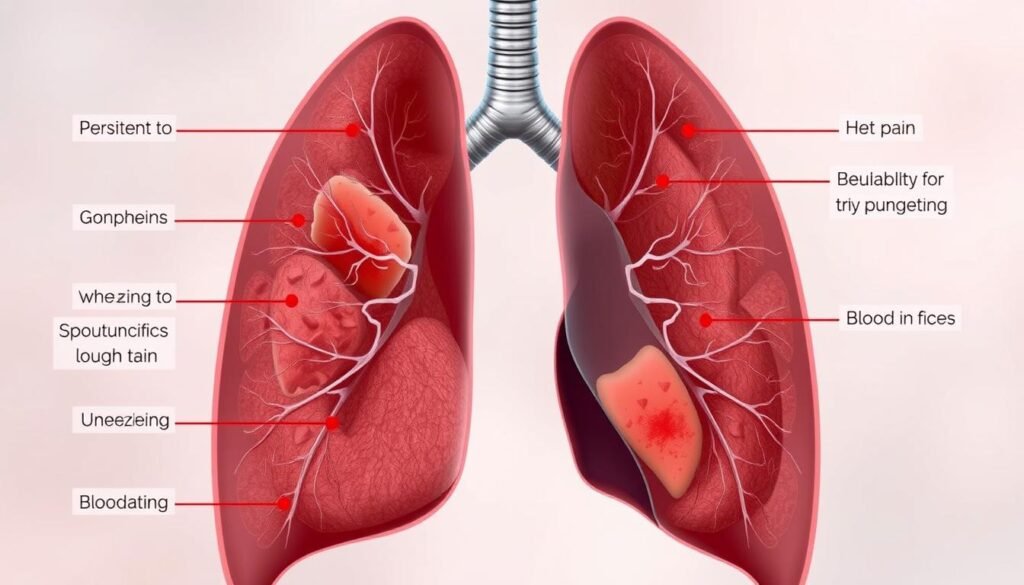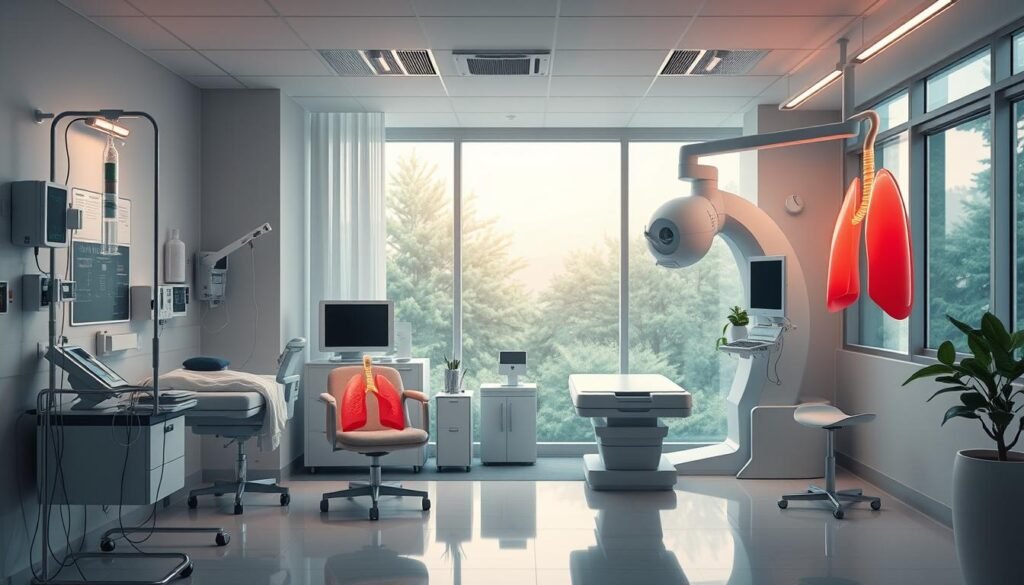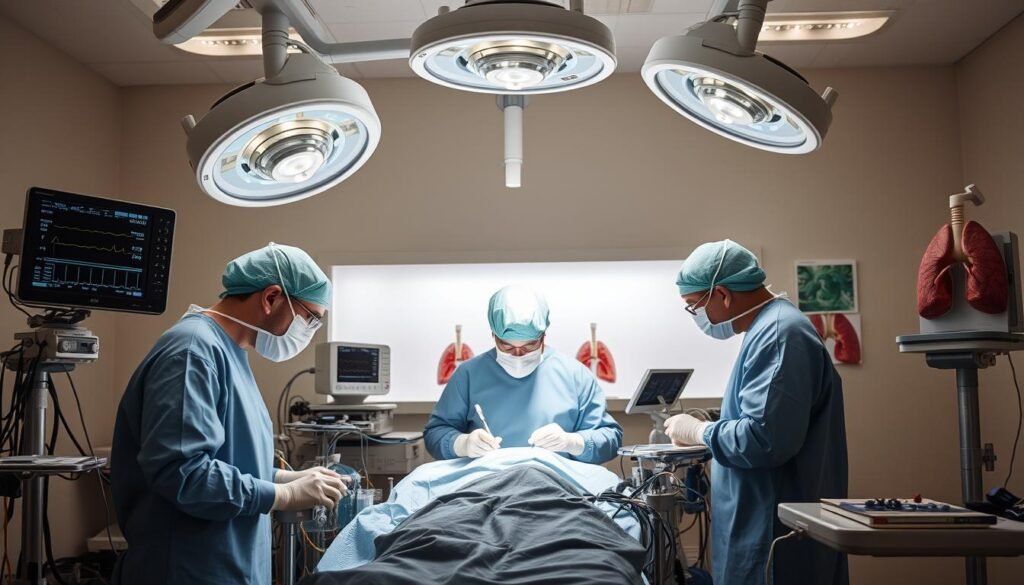Did you know over 236,000 new lung cancer cases are expected this year in the U.S.? That’s why early detection and specialized care are key to better outcomes. If you or a loved one has lung cancer, finding a local oncologist lung cancer specialist is vital.
Specialized care comes from a team. This includes medical, radiation, and surgical oncologists. They work together to create the best treatment plan, like chemotherapy and immunotherapy. With many treatments available, it’s important to find a specialist who knows the latest guidelines and can provide personalized care.
Finding the right oncologist can be easier with resources like national directories and local hospital networks. Sunrise Hospital and Medical Center is a good place to start. Fast access to the right care can hugely affect treatment success. So, for patients and their families, finding the right specialist is urgent.
Key Takeaways
- Over 236,000 new lung cancer cases are diagnosed in the U.S. annually.
- Specialized care leads to better treatment outcomes.
- The care team may include various specialists for comprehensive management.
- Utilizing directories can help find an oncologist tailored to individual needs.
- Timely access to specialized care is crucial in lung cancer treatment.
Understanding Lung Cancer
Lung cancer is a serious disease where cells in the lungs grow out of control. It can be caused by many factors, especially smoking. Knowing the symptoms and types of lung cancer helps in diagnosing and treating it effectively.
What is Lung Cancer?
Lung cancer starts when lung cells grow wildly, making tumors. These can spread throughout the body. It greatly impacts lung function and health. It’s vital to catch it early through screenings.
Common Types of Lung Cancer
There are mainly two kinds: small cell lung cancer (SCLC) and non-small cell lung cancer (NSCLC). NSCLC occurs in about 85% of cases. These cancers differ and need specific treatments.
To choose the right treatment, knowing the cancer’s details is key. The team at MountainView Hospital is great at this. They tailor the therapy based on the cancer type and stage.
| Lung Cancer Type | Common Characteristics | Treatment Options |
|---|---|---|
| Small Cell Lung Cancer (SCLC) | Fast-growing, often diagnosed at a later stage | Chemotherapy, radiation therapy |
| Non-Small Cell Lung Cancer (NSCLC) | More common, slower growth | Surgery, chemotherapy, targeted therapy |
Understanding the types of lung cancer is key to picking the right treatment. Having access to cutting-edge tests and care improves patient chances.
Symptoms of Lung Cancer
Knowing the symptoms of lung cancer early can help improve treatment. Symptoms vary widely among patients. It’s crucial for people to know the early and late signs. This knowledge leads to quicker doctor visits and help.
Early Symptoms to Watch For
Early symptoms might seem minor and easy to overlook. Recognizing these can lead to an early diagnosis. This is key for successful treatment. Look out for:
- Persistent coughing: A cough that sticks around for weeks and gets no better is a red flag.
- Chest pain: Feeling pain or discomfort in your chest, especially when you breathe deeply or cough.
- Unexplained weight loss: Losing weight when you’re not trying to could mean something serious.
- Fatigue: If you’re feeling more tired or weak than usual, pay attention.
Advanced Symptoms and Warning Signs
When lung cancer gets worse, the symptoms can be more intense. These serious symptoms need quick action. They include:
- Shortness of breath: Having trouble breathing or getting winded easily can happen.
- Coughing up blood: This scary symptom means you should see a doctor right away.
- Wheezing or hoarseness: If your breathing sounds different or your voice changes, it could be serious.
- Persistent pain: Ongoing pain in your back or chest should not be ignored.
If you notice any of these symptoms, don’t wait. Talk to a doctor. For the best care, finding a leading oncologist is crucial. To learn more, click on top lung cancer oncologists.

Lung Cancer Diagnosis
Finding lung cancer early is key to choosing the right treatments. Catching it soon can lead to better survival chances and more specific treatments. Doctors use many tests to find lung cancer, so knowing what these tests do is critical.
Diagnostic Tests and Procedures
Doctors use different tests to find and stage lung cancer. They often start with a CT scan to look for problems in the lungs. Other methods include:
- Endobronchial Ultrasound Bronchoscopy – This looks at the lungs and nearby lymph nodes.
- Electromagnetic Navigation Bronchoscopy – This finds smaller tumors with great accuracy.
- Sputum Tests – Testing mucus can spot cancer cells, showing lung cancer might be there.
- Biopsies – Taking lung tissue samples confirms the diagnosis and helps stage the cancer.
People who smoke or used to may get checked early with the Lung Cancer Screening Program. It finds lung cancer sooner when it’s easier to treat.
Importance of Early Detection
Finding lung cancer early improves treatment success. Early screenings find the cancer sooner. This means treatment can be simpler and more effective. People found early often can have surgery, unlike those found later who may need tougher treatments.
Early diagnosis of lung cancer is urgent. About 234,030 new cases were expected in 2021. Knowing and using tests to find cancer early can save lives.
Knowing the main types of lung cancer is important. It helps doctors choose the best tests for each person. Getting the right tests leads to treatments that work better.
| Diagnostic Test | Purpose | Procedure Overview |
|---|---|---|
| CT Scan | Screen for abnormalities | Imaging technique to visualize lungs and detect tumors. |
| Endobronchial Ultrasound | Examine lungs and lymph nodes | Minimally invasive procedure using ultrasound for guided biopsies. |
| Electromagnetic Navigation Bronchoscopy | Locate small tumors | Utilizes navigational technology for precise targeting. |
| Sputum Test | Identify cancer cells | Analysis of mucus samples for cancerous indicators. |
| Biopsies | Confirm diagnosis | Tissue sample collection for pathological evaluation. |
Lung Cancer Treatment Options
When facing lung cancer, patients have many treatments available. These options depend on their specific needs. Treatments include surgery and non-surgical methods, ensuring personalized and effective care.
Overview of Treatment Types
A variety of lung cancer treatments are available, such as:
- Surgery: Removes tumors and affected lung areas.
- Chemotherapy: Uses drugs to destroy or stop cancer cells.
- Targeted Therapy: Attacks cancer cell mutations directly.
- Radiation Therapy: Uses high-energy rays against cancer cells.
- Immunotherapy: Strengthens the immune system against cancer.
Comparing Surgical and Non-Surgical Options
Surgery versus non-surgical treatments is a key decision. Surgery often targets localized tumors to remove cancer. Meanwhile, non-surgical options help those with advanced disease or who can’t have surgery.
| Treatment Type | Benefits | Considerations |
|---|---|---|
| Lung Cancer Surgery | Completely removes tumors; can cure early-stage cases. | It’s invasive with potential complications; not for everyone. |
| Chemotherapy | Can shrink tumors; works at various disease stages. | Side effects can be tough; might need many treatments. |
| Targeted Therapy | Not harsh on normal cells; great for certain mutations. | Depends on tumor type; not every patient is eligible. |
| Radiation Therapy | Non-invasive; can reduce tumors or relieve symptoms. | Often requires numerous sessions; can have side effects. |
| Immunotherapy | Boosts body defenses; could have long-term benefits. | Effects vary; some may experience immune-related side effects. |

Treating lung cancer is a team effort. The team includes medical oncologists, pulmonologists, and others. They use their expertise to make a plan aimed at the best outcome for the patient.
Lung Cancer Surgery
Lung cancer surgery is crucial in treating lung cancer, offering a chance for a cure. Understanding the surgical options prepares patients for upcoming treatments. Each surgery type is chosen based on the patient’s needs and the cancer’s features.
Types of Lung Cancer Surgeries
There are different surgeries for lung cancer, each for specific conditions:
- Lobectomy: Removes one lung lobe, usually for early-stage non-small cell lung cancer.
- Pneumonectomy: Takes out an entire lung, often for large tumors or widespread cancer.
- Wedge Resection: Cuts out a small lung section with the tumor, for small, localized cancers.
These surgeries can be done with minimally invasive methods for faster recovery and less pain after surgery. The Center for Thoracic Cancers offers these advanced options, including surgeries that save as much lung as possible.
What to Expect Before, During, and After Surgery
Getting ready for lung cancer surgery involves steps to prepare mentally and physically. Patients might need more tests or imaging before surgery. They might also get medications for pain and anxiety. It’s normal to meet the surgical team to talk about the surgery.
During the operation, patients are given anesthesia, and surgeons work carefully, watching vital signs. After surgery, care is vital for healing. This includes:
- Monitoring right after in a recovery room.
- Pain management with prescribed medications.
- Slowly starting physical activities and breathing exercises for better recovery.
Recovery time depends on the surgery type, but improvement is often seen within weeks. Keeping up with visits to the healthcare team is key for healing and addressing concerns. Lung cancer surgery is a major part of treating the disease.

Lung Cancer Radiation Therapy
Lung cancer radiation therapy is key for treating different lung cancers. It uses high-energy beams to kill cancer cells. It tries to protect the healthy cells close by. Patients should understand how it works and its possible side effects.
How Radiation Therapy Works
Its main goal is to eliminate cancer cells in the lungs. The treatment uses advanced methods, including:
- Intensity-modulated radiation therapy (IMRT): This technique precisely targets tumors, saving healthy tissue.
- Volumetric modulated arc therapy (VMAT): It attacks the tumor from many angles for better coverage.
- Proton therapy: This method uses protons, focusing on tumors and sparing nearby organs.
Research shows that combining chemotherapy, radiation therapy, and surgery can be very effective. Centers like Fox Chase Cancer Center offer custom treatments for their patients.
Potential Side Effects of Radiation Therapy
Although it’s a powerful treatment, radiation therapy has side effects. Knowing these helps patients deal with them better. Some common side effects are:
- Fatigue: This is common as the body heals.
- Skin irritation: There might be redness, peeling, or soreness where treated.
- Respiratory issues: Some patients might cough or have trouble breathing.
Understanding side effects helps in managing expectations. Healthcare providers work to meet the physical and emotional needs of their patients. This ensures well-rounded care during their treatment.
Lung Cancer Immunotherapy
Lung cancer immunotherapy is a big step forward in treating lung cancer. It uses the immune system to fight cancer cells. This gives patients a new way to battle this tough disease.
What is Immunotherapy?
Immunotherapy uses drugs to make the immune system attack cancer cells better. For lung cancer, drugs like nivolumab and pembrolizumab are promising. They help the immune system target specific tumors. This method is different from others because it tries to boost the body’s ability to kill cancer.
Benefits and Challenges of Immunotherapy in Lung Cancer Treatment
Immunotherapy for lung cancer can have fewer side effects than traditional treatments. This is because it strengthens the immune system instead of attacking cells directly. Also, some patients may see their cancer in remission for a long time.
However, lung cancer immunotherapy has its hurdles. Not all patients respond the same way, making it hard to predict success. Researchers are trying to find markers that can tell us who will benefit most. Also, handling side effects from the immune system can be tricky.
Lung Cancer Clinical Trials
Lung cancer trials are key in improving treatments and outcomes. They offer patients new therapies tailored to their needs. These trials advance our knowledge, leading to future breakthroughs.
Benefits of Participating in Clinical Trials
Joining a trial can have many benefits. Patients get access to new treatments early and are closely monitored. They also help future lung cancer patients by contributing to research. Trials focus on comprehensive care for participants.
How to Find Clinical Trials Near You
Finding trials nearby can be easy. Major cancer centers list current trials. Cancer websites have search tools for trials by location and eligibility. Your oncologist can also help find trials and guide you.